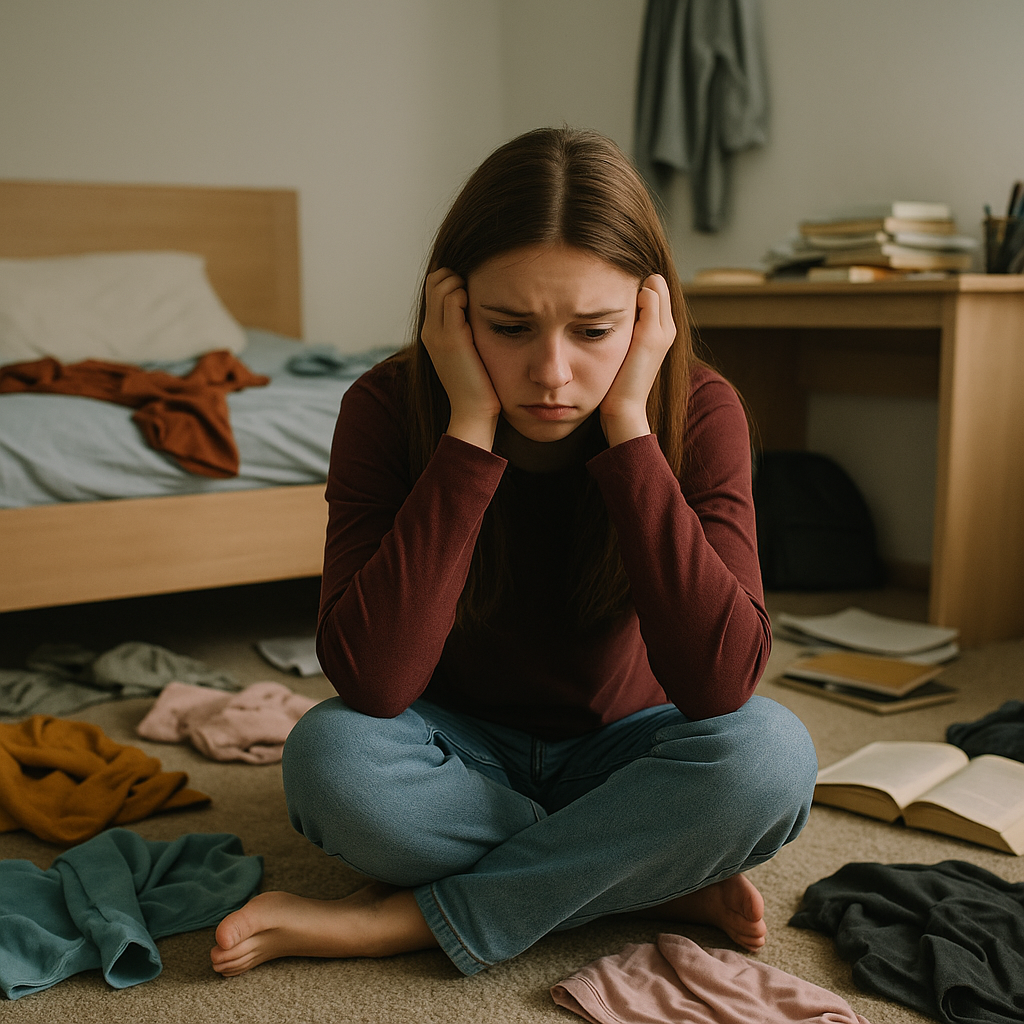If you’re constantly fighting with your teen about their messy room, you’re not alone. Many ADHD teens struggle with tasks that seem simple to others—like putting away laundry or clearing a desk. But here’s the truth: it’s not laziness or defiance. It’s about how their brain works. In this post, we’ll explore real strategies that work with their brain, not against it—so you can support them without the daily drama.

Why ADHD Teens Struggle With Cleaning
If your teen’s room looks like a crime scene from a craft store explosion, it’s not because they don’t care. ADHD (Attention Deficit Hyperactivity Disorder) affects executive function—the part of the brain responsible for planning, organising, remembering, and completing tasks.
And when you’re neurotypical, it’s easy to forget that what feels “easy” to you—like picking up a sock—can feel like climbing a mountain to someone else.
They might:
- Forget what they were doing mid-task
- Get overwhelmed by the volume of stuff
- Hyper-focus on one thing and miss everything else
- Experience “object permanence” issues (if they can’t see it, it doesn’t exist)
A Story That Changed How I Parent
Years ago, I worked with an incredibly creative AuDHD teen (that’s Autism + ADHD, but today we’re focusing on ADHD). One day, inspiration struck and she urgently needed her favourite pen.
She tipped out her entire pencil case onto the floor, found the pen, uncapped it, and got to work.
The cap stayed on the floor. She didn’t notice.
Even after she was done.
She didn’t notice the cap, or the pencil shavings and debris from the emptied-out pencil case.
She didn’t notice the food wrappers on her bed.
Why? Because once she was in “task mode,” the rest of her environment faded away. It wasn’t neglect—it was attentional blindness, a common ADHD trait. The brain was so focused on one goal that it filtered out everything else.
This story helped me see my own kid in a new light.
How to Support your ADHD Teen With Their Space
Here’s a list of strategies that are realistic, neurodivergent-friendly, and actually work—because they’re designed for how ADHD brains really function.
1. Break Tasks into Micro-Steps
- “Clean your room” is too vague. Try:
- Pick up 3 things from the floor
- Put cups in the sink
- Find one lost sock
🧠 Why it works: Reduces overwhelm and gives a clear starting point.
2. Use Visual Checklists
Photos or icons work better than words. Place the list where they’ll see it (like the door or mirror).
🧠 Why it works: Helps with memory and decision-making fatigue.
3. Try the “Five Things Method” (by KC Davis)
Sort everything into:
- Trash
- Laundry
- Dishes
- Things that have a home
- Things that don’t (yet)
🧠 Why it works: Simplifies decision-making and avoids getting stuck.
4. Set a Short Timer
5–10 minutes is enough. Let them stop when the timer ends (or keep going if they want!).
🧠 Why it works: Gets them started without pressure.
5. Use Body Doubling
Sit in the room with them or co-work on video. They clean while you do admin. No talking needed.
🧠 Why it works: Shared focus boosts motivation and reduces task paralysis.
6. Make It a Game
Try:
- “How much can you clean before this song ends?”
- “Roll a die to choose a task”
- “Tidy 5 things in each corner”
🧠 Why it works: Dopamine! Play makes it feel less like a chore.
7. Anchor It to Routine
Link it to another habit, like brushing teeth or schoolwork. Same time, same steps.
🧠 Why it works: Routines remove the need for willpower.
8. Celebrate Small Wins
Take a “ta-da” photo. Give them a high five. Let them show off what they did.
🧠 Why it works: Recognition builds confidence and encourages repeat effort.
Gentle Reminders for Parents of an ADHD teen
- Not every strategy will work all the time. Try one or two, not everything at once.
- They’re not broken. They don’t need fixing. They need understanding.
- Perfection isn’t the goal. A usable space they feel good in is enough.
Progress is progress, even if it’s just one sock in the basket.
Want More Support?
If you found this helpful, check out:
The Simplicity Toolkit: Our monthly membership with strategies, templates, and body doubling sessions.
Simplicity with Lauren Winzar: A self-paced course to transform your home (without shame or overwhelm).
Book a Coaching Session: One-on-one support, tailored to your family.
